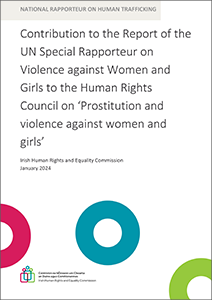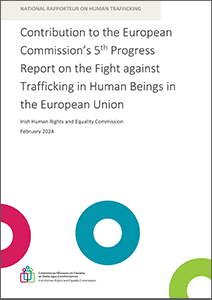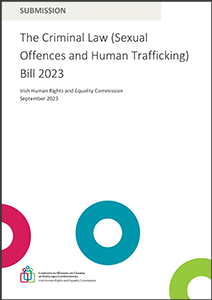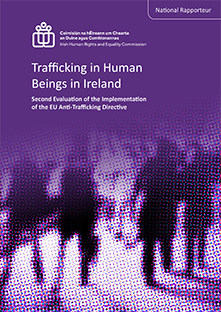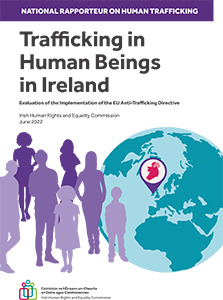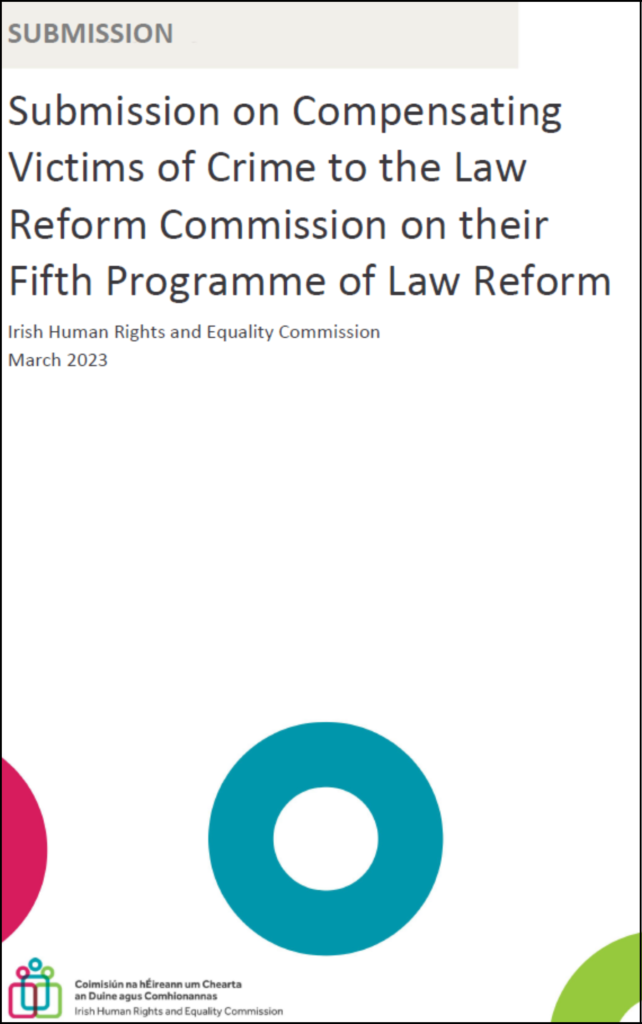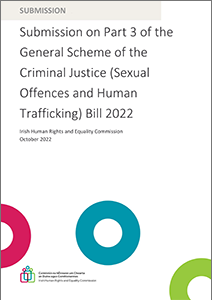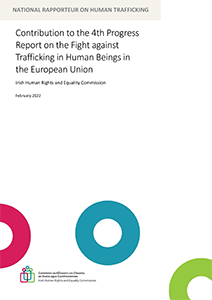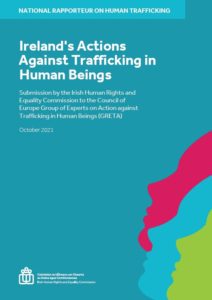National Rapporteur on the Trafficking of Human Beings
In October 2020, the Irish Human Rights and Equality Commission became Ireland’s Independent National Rapporteur on the Trafficking of Human Beings.
Under Article 19 of the European Union (EU) Anti-Trafficking Directive all EU Member States are legally required to have National Rapporteurs or equivalent mechanisms.
What is Human Trafficking?
Human trafficking is a serious and heinous human rights violation. It is deeply gendered and racialised.
The EU Directive defines Human Trafficking as:
The definition also covers trafficking in human beings for the purpose of other behaviour, such as illegal adoption or forced marriage in so far as they fulfil the constitutive elements of trafficking in human beings.
Human Trafficking in Ireland
Ireland is not immune to trafficking.
Year after year, the experiences of front-line responders, the accounts of victims, and the data itself clearly shows that human trafficking crimes are being committed in Ireland, and people are being exploited for profit.
Trafficking in human beings in Ireland remains a hidden but common crime. The true extent of human trafficking in Ireland is likely much higher than official statistics report. This is partly due to issues around identifying victims.
More women (66%) are trafficked than men (33%), and almost all are from a migrant background
Trafficking for the purposes of sexual exploitation, labour exploitation, and to a lesser extent, forced criminal activities, are the most represented types of exploitation in Ireland. These account for 55%, 38% and 7%, respectively, between 2013 and 2021.
This situation mirrors the picture from other EU Member States.
Children account for 9% of the victims, which is significantly less than the EU average (22%).
The profile of victims within the various types of trafficking exploitation is also highly gendered. For example, trafficking for the purposes of labour exploitation affects a higher proportion of men (69%), while trafficking for sexual exploitation affects almost exclusively women (96%).
In Ireland, the Minister for Justice is responsible for the coordination of the States anti-trafficking response.
This means that the Department of Justice is the National Anti-Trafficking Coordinator. An important aspect of that role is ensuring that relevant State departments, agencies and bodies fulfil their obligations as part of the overall implementation of the EU Anti-trafficking Directive.
The Department of Justice dedicated Anti-Human Trafficking website, Blueblindfold has information on a range of State, international, and community and voluntary organisations working to provide support services for people affected by Human Trafficking.
The Irish Human Rights and Equality Commission is the National Rapporteur on the Trafficking of Human Beings.
What is the Role of a National Rapporteur on the Trafficking of Human Beings?
The EU Anti Human-Trafficking Directive requires a National Rapporteur to:
- assess trends in trafficking in human beings;
- measure results of anti-trafficking actions;
- gather statistics (including in co-operation with relevant civil society organisations); and
- report.
How are we fulfilling that role?
As National Rapporteur, we prepare and publish monitoring reports and thematic reports evaluating Ireland’s overall performance against the State’s international obligations such as the EU’s Anti-Trafficking Directive, the Council of Europe’s Convention on Action against Trafficking (2005) and the UN Palermo Protocol – Protocol to Prevent, Suppress and Punish Trafficking in Persons Especially Women and Children (2000), supplementing the United Nations Convention against Transnational Organized Crime.
Our values are underpinned by a holistic, equality, human rights, victim-oriented, gender-specific and child-centred approach to human trafficking.
We prepare Independent Reports of State action, to align with international monitoring in this area. Our reporting provides a strong and credible baseline for external evaluations. We also contribute to the development of the research and evidence base required to underpin effective monitoring and policy development.
Reports
Contribution to the Report of the UN Special Rapporteur on Violence against Women and Girls to the Human Rights Council on ‘Prostitution and violence against women and girls’ (January 2024)
Contribution to the European Commission’s 5th Progress Report on the Fight against Trafficking in Human Beings in the European Union (February 2024)
Second Annual National Evaluation Report of the Implementation of the EU Anti-Trafficking Directive (September 2023)
First Annual National Evaluation Report of the Implementation of the EU Anti-Trafficking Directive (June 2022)
Submission on Compensating Victims of Crime to the Law Reform Commission on their fifth programme of law (March 2023).
Submission on Part 3 of the General Scheme of the Criminal Justice Sexual Offences and Human Trafficking Bill 2022 (October 2022)
Contribution to the 4th Progress Report on the Fight against Trafficking in Human Beings in the European Union (February 2022)
Submission to the Council of Europe Group of Experts on Action against Trafficking in Human Beings (GRETA) (October 2021)
Launch of the Second Report of the National Rapporteur on Human Trafficking
In September, we launched the Second Annual National Evaluation Report of the Implementation of the EU Anti-Trafficking Directive at a hybrid conference. You can view the video below.
Timestamps to see certain speakers.
Introduction – Ms Sinéad Gibney
13.05 – Dr Nusha Yonkova
25.25 – Sinéad Gibney introducing Survivors
26.54 – Ola Daniels (im sure we don’t put there names up?) do we edit out?
34.50 – Second Survivor
37.30 – Mr Ben Ryan
51.16 – Dr Petya Nestorova,
1.07.49 – Michael Clausen U.S. Deputy Chief of Mission
1.13.00 – MEP Malin Björk
1.21.25 – Ms Saga Brodersen
1.33.49 – Q&A
2.05.15 – CUT FOR LUNCH
2.55.06 – Introduction Ms Noeleen Blackwell, Commissioner
2.58.13 – Ms Tatiana Kotlyarenko
3.16.00 – Ms Sunniva McDonagh SC Commissioner
3.28.40 – 4.19.30
Panel 1
Ms Ann Mara, Mr Brian Killoran, Ms Kathryn McGrath, Ms Isabel Toolan, Ms Mia de Faoite.
Break 4.19.30 to 4.39
4.39 – Sinead Gibney Introducing Mr Andrea Salvoni
4.43 – Mr Andrea Salvoni
4.57 – Panel 2
D/I Dany Kelly, Ms Niamh Hodnett, Dr Patricia Brazil BL, Dr Ray Genoe, Ms Ruth Breslin.
5.59.22 Sinead Gibney – Closing remarks
Recommendations
In our first evaluation report, Trafficking in Human Beings in Ireland, we issued a number of detailed recommendations about
policy, legislation and procedures around anti-human trafficking. We also gave some specific recommendations to State agencies involved in the implementation of the anti-trafficking response.
Key recommendations include that the State:
- urgently develops and agrees a new National Action Plan on Human Trafficking that contains clear parameters with regards to time, implementation responsibility and oversight of progress. Synchronicity between this action plan and the recently adopted National Strategy on Domestic, Sexual & Gender-Based Violence, as well as anti-racism commitments are essential in this regard.
- urgently adopts the legislation establishing a new modern National Referral Mechanism for identification of victims that is applicable to all victims and that puts the assistance measures in primary legislation. As part of this process, we recommend that the State establishes a child-specific National Referral Mechanism for victims of trafficking who are children. See our Submission on Part 3 of the General Scheme of the Criminal Justice (Sexual Offences and Human Trafficking) Bill 2022 for full details on this recommendation.
- acts upon its commitment to establish a safe gender-specific shelter for victims of trafficking, and end the use of Direct Provision.
- strengthens the non-prosecution of victims of trafficking for crimes they were compelled to commit while trafficked.
- establishes practical avenues for compensation that are available to trafficking victims of all forms of exploitation.
What is the Law in Ireland?
The primary statutes that give effect to Ireland’s international obligations to combat human trafficking are the Child Trafficking and Pornography Act 1998 and the Criminal Law (Human Trafficking) Act 2008.
The Human Trafficking Act was subsequently amended in 2013 by the Criminal Law (Human Trafficking) Amendment Act 2013 to include forced begging and forced engagement in criminal activities as new forms of trafficking.
Importantly, the Act also includes a definition of forced labour.
The legislation provides for dissuasive penalties of up to life imprisonment and, at the discretion of the court, and an unlimited fine. Additionally, other statutes containing trafficking-related offences are particularly important to consider in the overall human trafficking response.
Significant National Developments
- Release of the General Scheme Criminal Justice (Sexual Offences and Human Trafficking) Bill 2022.
This is a significant piece of draft law which will, for the first time, formalise the identification process for persons who are suspected victims of trafficking, and will outline what assistance and supports they should receive. We are working with our NGO, survivors, Civil Society and State Agency partners to make sure that more victims are identified and that they receive the supports and assistance they are entitled to. Read our full recommendations on this in our Submission on Part 3 of the General Scheme of the Criminal Justice (Sexual Offences and Human Trafficking) Bill 2022 . - Draft Third National Action Plan to Combat and Prevent Human Trafficking
The drafting of this Action Plan is underway and the Commission looks forward to further engagement with this significantly important work. A comprehensive, victim and trauma-informed National Plan is fundamental to combatting trafficking in all its forms. - Review of the Atypical Working Scheme
The Commission welcomes the review of the Atypical Working Scheme (AWS) for non-EAA fishers, reiterating the need of occupation-specific permits to allow job mobility as a risk prevention.
How is Human Trafficking monitored internationally?
- US Department of State Trafficking in Persons Report
US State Department 2022 Trafficking in Persons Report Ireland – (Tier Two status)
This report monitors the implementation of UN Palermo Protocol (Protocol to Prevent, Suppress and Punish Trafficking in Persons Especially Women and Children, supplementing the United Nations Convention against Transnational Organized Crime) - Council of Europe Group of Experts on Action against Trafficking in Human Beings (GRETA) is responsible for monitoring the implementation of the Council of Europe Convention on Action against Trafficking in Human Beings.
GRETA Third Evaluation Report on Ireland - Anti-Trafficking Directive (Directive 2011/36/EU of the European Parliament and of the Council of 5 April 2011 on preventing and combating trafficking in human beings and protecting its victims, and replacing Council Framework Decision 2002/629/JHA)
- OSCE’s Office of the Special Representative and Co-ordinator for Combatting Trafficking in Human Beings

![[ACTION] “The recruitment, transportation, transfer, harbouring or reception of persons, including the exchange or transfer of control over those persons, [MEANS] by means of the threat or use of force or other forms of coercion, of fraud, of deception, of the abuse of power of a position of vulnerability or of the giving or receiving of payments or benefits to achieve the consent of a person having control over another person, [EXPLOITATION] for the purpose of exploitation. Expoloitation shall include, at a minimum, the exploitation of the prostitution of others or other forms of sexual exploitation, forced labour or services, slavery or practices similar to slavery, servitude or the removal of organs."](https://www.ihrec.ie/app/uploads/2022/10/Human-Trafficking-Definition-1-1024x657.png)
